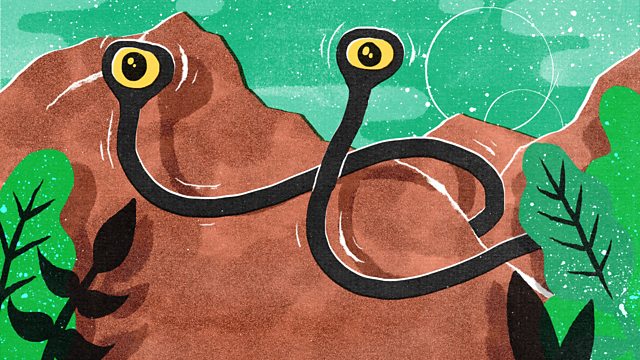Emotional Aliens
Christine Nicol explores the meaty problem of eating aliens and how to choose which one. When Jake the spaceman crashes on a planet he has to eat the locals, how does he decide?
Jake the Spaceman (aka comedian Jake Yapp) has crash-landed on a remote planet and doesn't have much food to keep him going until he is rescued. Fortunately, the planet is teeming with alien life forms that are edible, but which ones should he eat? He wants to cause the minimum amount of pain and distress to the creatures, so what does he need to know about the nature of the beings on the planet? Can they feel pain? If so, how can he minimise suffering? Will eating an alien cause distress to others? Is the alien so aware and sensitive to its environment that Jake needs to consider whether it is a non-human person?
Christine will interview animal welfare scientists, philosophers and wildlife biologists to get under the skin of animal sentience and the potential consequences of accepting that animals are conscious, aware creatures.
These big questions generate surprising and challenging insights into our attitudes to other life. When you know absolutely nothing about the alien in front of you, what do you need to know before eating it?
Last on
More episodes
Previous
Next
Professor Tim Birkhead

He came up with an innovative way to count the birds and determine how many chicks were produced each year. By marking birds individually with colour rings he was able to measure their breeding success, see how old they are when they first start to breed and see how long the birds live.
When he began his studies, the guillemot population breeding on Skomer was just 2,000 individuals, yet pictures of the island 30 years earlier show that there had been around 100,000 guillemots then. In 2011, the population showed signs of recovery when around 20,000 individuals were recorded.
Professor Ludwig Huber

His research covers comparative cognition in fish, amphibians, reptiles, birds and mammals, including humans. He also studies perception, categorisation and concept formation in pigeons, social learning, imitation and empathy in marmosets and dogs, technical intelligence, emulation, exploration and tool use in kea and evolution of social cognition in tortoise and lizards.
Professor Georgia Mason

In 2015, she received a  for her research across a range of species; for increasing understanding of the relationships between animal husbandry and animal welfare; and for being a role model and mentor to the next generation of animal welfare scientists.
Dr Rob Thomas

Among his areas of research are the impacts of human activities on wild animals, impacts of light and noise pollution on wildlife, impacts of capture and handling on birds and other animals.
Professor John Webster

He was also a founding member of the Farm Animal Welfare Council and one of the first proponents of the concepts of the five welfare freedoms. He is also the author of Animal Husbandry Regained: The Place of Farm Animals in Sustainable Agriculture, which seeks to identify and explain the causes and contributors to current problems in animal husbandry, especially those related to 'factory farming', and advance arguments that may contribute to its successful re-orientation.
Dr James Yeates

Broadcast
- Wed 16 Dec 2015 21:00Â鶹ԼÅÄ Radio 4
What is Online First?
An explanation of Online First.

